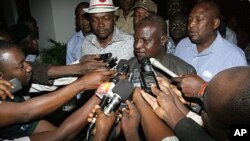Officials at Nigeria's main airport in Lagos have locked a group of foreign and national journalists out of the press center, confiscated their equipment and accused them of posing a national security risk.
Officials of the State Security Service and the protocol department of the Ministry of Foreign Affairs have threatened the journalists with arrest if they try to recover their cameras, voice recorders and other items.
The press center is provided for the use of journalists at the airport, and local journalists say they have used the facility for over 30 years without problems.
The lockout has now been going on for five days, with no real explanation as to the cause.
Journalists believe President Goodluck Jonathan was uncomfortable with reports about people's movements around the airport, including a picture of one traditional leader using a presidential jet.
Others say the dispute arose after officials tried unsuccessfully to suppress reports about a robbery at the airport Wednesday.
The minister of information, Labaran Maku, says that he is not commenting on this issue. He was not any more forthcoming with the Nigeria Union of Journalists (NUJ).
NUJ president Mohammed Garba says that, whatever the reason for it, the action is unjustifiable.
"We have a social responsibility to the people of this country and we are backed by the constitution," said Garba. "Therefore, we should not be regarded as a security threat."
Garba went on to express his concern that this is a harbinger of bad news for journalists in Nigeria.
"If there is not any serious reason or base for this action, we will consider it to be part of a deliberate plan by the government to clamp down on journalists," added Garba.
The Committee to Protect Journalists (CPJ), an American organization that works to safeguard press freedom worldwide, is calling on Nigerian authorities to explain the lockout - and to ensure that journalists are free to carry out their work.
"It is unclear as to why they are being locked out," said CPJ Africa Advocacy coordinator Mohamed Keita. "Our inquiries have been met with silence and authorities have refused to comment on the matter. Local journalists believe it is in retaliation to coverage that the government is not pleased with, and the authorities have been quoted in news reports as saying that the journalists cause a national security threat."
Keita said the journalists should be given their equipment back.
"This is totally arbitrary and it is a challenge to the rule of law in Nigeria - at least the authorities should provide an explanation of why they have taken this action," Keita added.
Nigeria has a history of press censorship, despite an abundance of news organizations in the country, especially newspapers.
Political leaders are often suspicious of the press, and military regimes and civilian administrations have often violated constitutional rights to press freedom. Reporters Without Borders, another media advocacy group, usually ranks Nigeria in the bottom fourth of all countries worldwide in its annual Press Freedom Index.
Journalists Face Difficulties in Nigeria
- By Jane Labous




